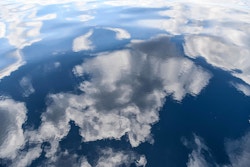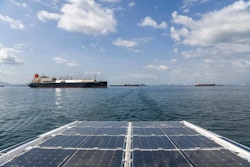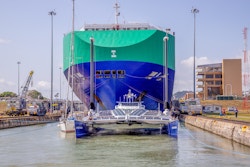One Ocean Summit: the international meeting for the Sea
Between the 9th and 11th of February, the One Ocean Summit will be held in Brest, an international event gathering experts, elected politicians, scientists, business leaders and civil society representatives to discuss the threats to our oceans. The goal? "To raise the collective level of ambition of the international community on maritime issues and translate our shared responsibility to the Ocean into tangible commitments."
Speaking at the "Greening maritime corridors: from R&D to Zero emission ships" forum, Victorien Erussard will present the features of our new zero-emission ship: Energy Observer 2.
Katia Nicolet, on-board scientist, outlines the context of this event and why it is crucial to act today to change how we see the ocean.
The largest climate regulator on earth
The ocean covers 70% of the earth’s surface and represents 97% of all available water. In addition to its critical role in sustaining the world’s economy, the ocean is earth's greatest climate regulator; it absorbs 94% of the excess heat produced by human activities and 25% of anthropogenic CO2 emissions each year. In addition, the ocean is responsible for producing half of the oxygen we breathe. In other words, the ocean acts as a buffer against human impacts, and regulates the climate to sustain life on earth.

Squalls at sea
Despite its undeniable importance, the ocean has always been perceived as an inexhaustible resource. We have built our global economy around it: 80% of the world's goods sail through our seas, two-thirds of the human population live on the coasts and 260 million people work in the fishing and aquaculture sector. We live on the ocean side, we dispose of our waste there, we fish there, we go there on vacation, we transport our goods there... The ocean is perceived as a resource, a common good and a right, but this vision blinds us to the dramatic impacts our behavior has on this crucial, complex and fragile ecosystem.

Energy Observer departing from the Panama Canal
The governance of the high seas at the center of the debate
Now is the time to change our behavior towards the ocean. It is imperative to regulate its uses and limit the human and climatic impacts on the ocean.
“The seas and oceans are contested spaces- places of intense economic competition - yet, they are, simultaneously, endangered common goods.”
A major hindrance today towards the harmonization of international regulations is the lack of legislation on the high seas (sea not belonging to any country). It represents 60% of the oceans’ surface, but is exposed to excessive exploitation in the absence of a strict international legal framework. Ocean governance is therefore a major debate point for the One Ocean Summit.
What roadmap for maritime transport?
Another crucial point this week: the issues around maritime transport and the commercial vessels of the future. To transport almost all of the world's goods, commercial ships have become more numerous, larger and faster over the past 50 years. Today, 99,800 merchant ships crisscross our oceans to transport 11 billion tonnes of goods each year.

Energy Observer traverse le Canal de Panama
These ships inevitably have a considerable impact on the marine ecosystems, especially since they still use fossil fuels for their propulsion: heavy fuel oil, diesel, liquefied natural gas (LNG; specifically, methane). The Brest summit is an opportunity to give political incentive to reach international agreements on the governance and protection of the ocean. It is time for major shipping companies to commit to rapid decarbonization of their fleets.
“We hope to be able to gather in Brest major European shipowners (whose impact is worldwide in reality), but also major shipbuilders and major European ports in the virtuous steps of labeling.”
In this political context of transition, Energy Observer fiercely promotes the use of green energies and hydrogen for the propulsion of future zero-emission ships. It is now obvious that we must reduce greenhouse gas emissions from merchant ships. And in this cautious debate, between reduction of cruising speeds and transitory use of LNG, Energy Observer wants to take an avant-garde position, offering a radical departure from the other propositions debated today.
« Let's commit ourselves, together, without delay, to the ocean, our common good. »
The President @EmmanuelMacron wants us to join the #OneOceanSummit from February 9th to the 11th, 2022 in Brest.
The current technologies engineered, tested and optimized by Energy Observer prove that a zero emissions future at sea is possible, and that we must give political and industrial momentum in the right direction.